26 of the best beaches in Spain
Take a dive into the Iberian Peninsula’s finest coastlines
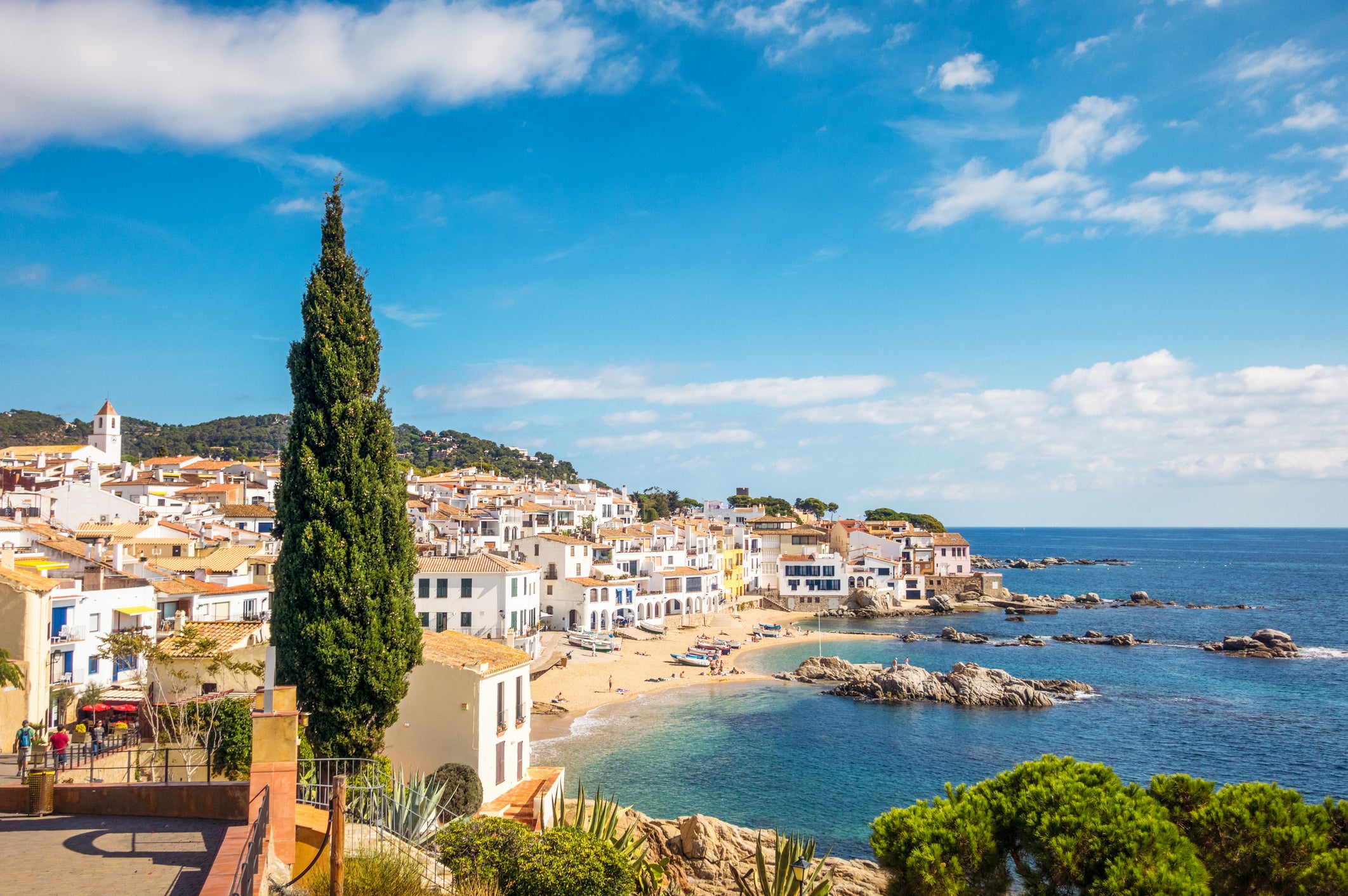
Your support helps us to tell the story
From reproductive rights to climate change to Big Tech, The Independent is on the ground when the story is developing. Whether it's investigating the financials of Elon Musk's pro-Trump PAC or producing our latest documentary, 'The A Word', which shines a light on the American women fighting for reproductive rights, we know how important it is to parse out the facts from the messaging.
At such a critical moment in US history, we need reporters on the ground. Your donation allows us to keep sending journalists to speak to both sides of the story.
The Independent is trusted by Americans across the entire political spectrum. And unlike many other quality news outlets, we choose not to lock Americans out of our reporting and analysis with paywalls. We believe quality journalism should be available to everyone, paid for by those who can afford it.
Your support makes all the difference.The wonders of Spain’s many beaches are one of the country’s worst-kept secrets.
Hundreds of thousands descend on the roughly 5,000 miles of Spain’s Mediterranean and Atlantic coastlines every summer, whether it’s for a fly-and-flop all-inclusive in the Canaries, a last-minute city break in Barcelona or a beach-day, club-night holiday in Ibiza or Mallorca.
Golden sands and deep blue waters line the shores of cities like San Sebastian and Valencia, while the less popular tourist destinations such as Galicia or Cantabria are home to dazzling landscapes that surround white sands and emerald seas.
Choosing the best beaches to visit can feel almost impossible in a country with Mediterranean archipelagos, beach towns and sun-drenched islands as far south as North Africa. Fortunately, we’ve curated a list of some of the best.
Read more: This exclusive Mallorca village is a must-visit spot in the Balearics
Platja de Sant Sebastia/Sant Miquel, Barcelona
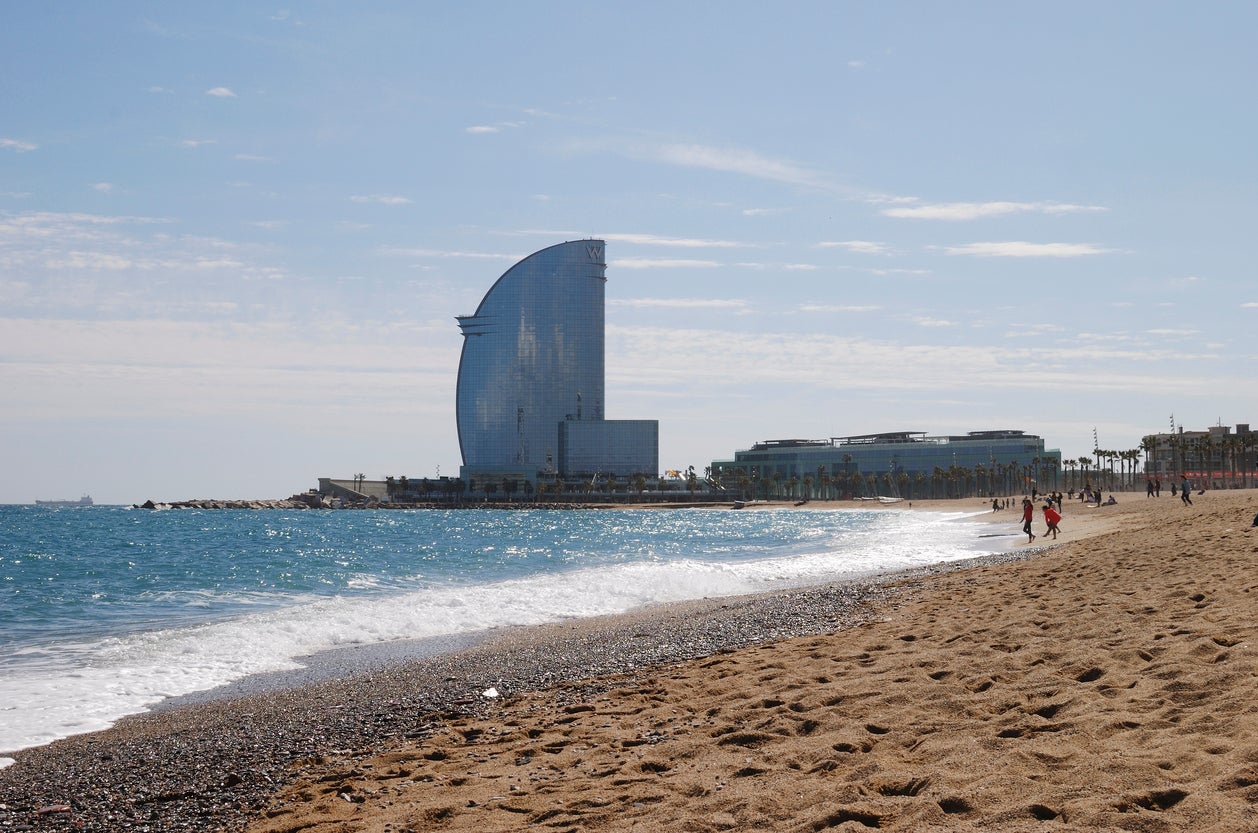
The trio of Sant Sebastia, Sant Miquel and Barceloneta form the main ‘city beaches’ in Barcelona, meaning they’re easily accessible on foot from the city centre. Though Sant Miquel is one of the oldest beaches in the city – the area was transformed in 1755 – nowadays it is often lumped together with Sant Sebastia; in any case, the two areas offer over a kilometre of soft golden sand and blissfully calm waters that are ideal for relaxed swims. While Bogatell or Mar Bella may be quieter, the restaurants and chiringuitos that sit on the sands or line the promenades give the area a pleasantly energetic atmosphere.
Read more: The essential guide to Barcelona
Maspalomas, Gran Canaria
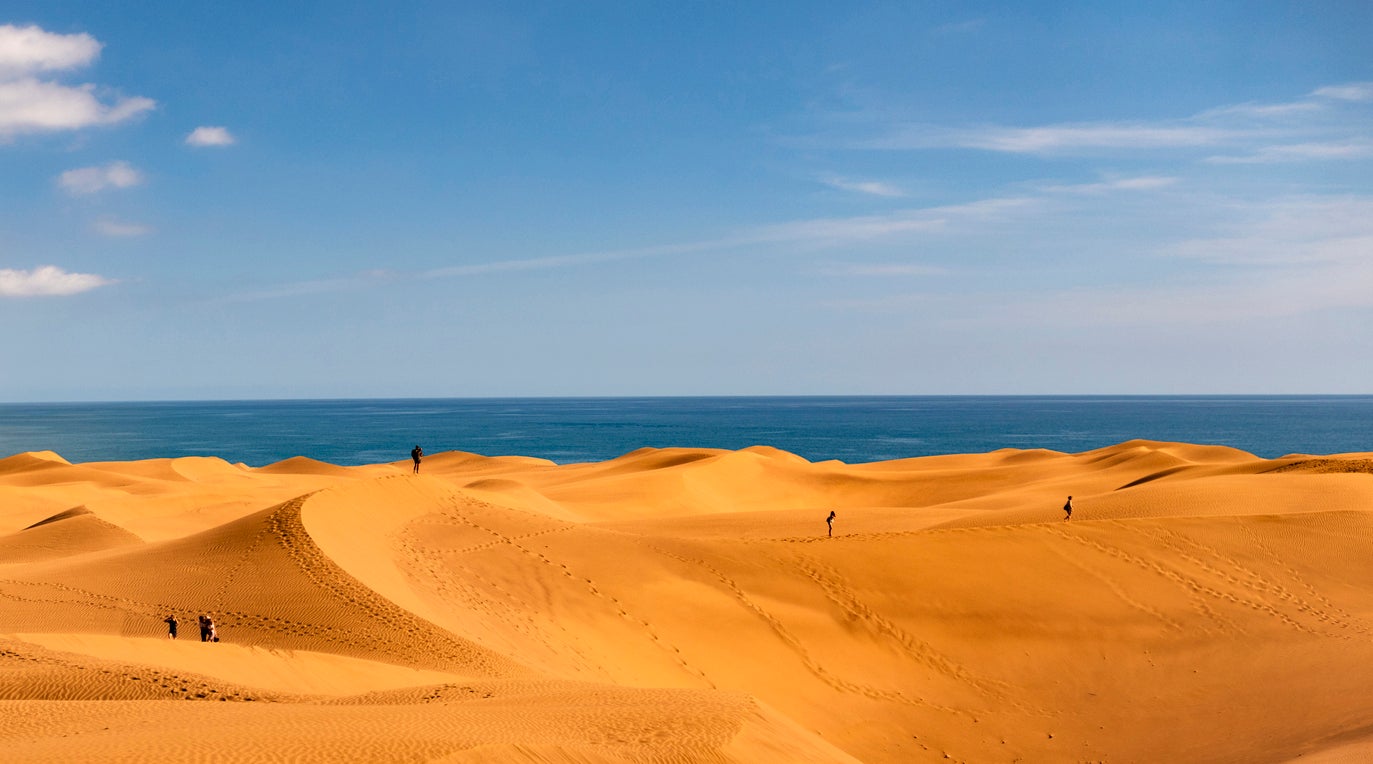
A quick look at the photos of Maspalomas might trick you into thinking it is part of an Arabian desert, but in reality this 1,000-acre dune system sits on the southern coast of one of Spain’s most striking islands, Gran Canaria.
Running for 3km, this landscape is one of the most unique in Spain, where the beautifully golden sands contrast with the deep blue waters of the Atlantic Ocean. As with the rest of the Canaries, Maspalomas also benefits from year-round sunshine. As it is a protected area, be sure to stick to marked paths and trails.
Read more: Why the Canary Islands should be your next holiday destination for winter sun
La Concha Bay, San Sebastian
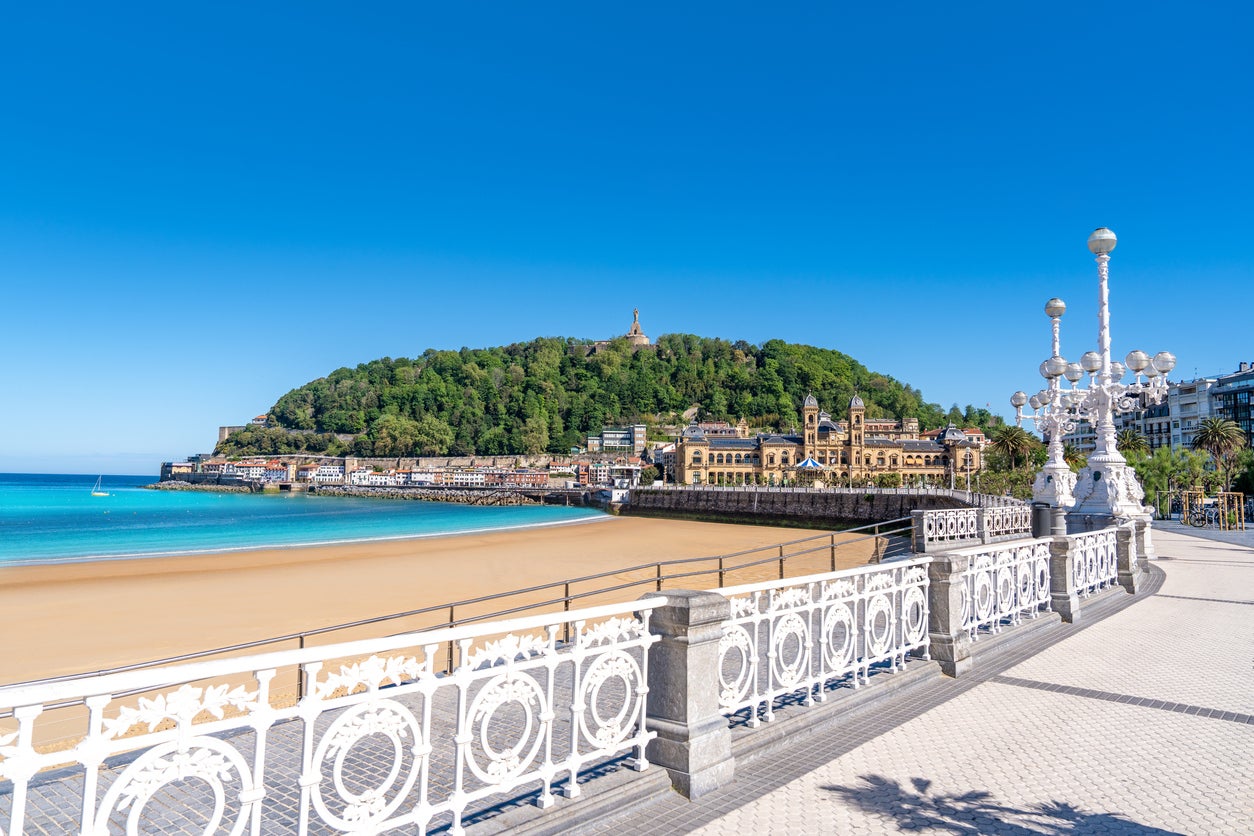
The satisfyingly smooth curve of La Concha Bay is undeniably one of Spain’s most famous beaches, as well as one of San Sebastian’s most easily identifiable characteristics. It sweeps for over a kilometre across the front length of the city, with several different beach areas, including La Concha Beach and Ondarreta. Flanked on either side by Mount Igueldo and the magnificent Alderdi Eder park, this bay area is arguably the most activity-filled in the country, with the potential for hiking, Michelin-starred dining and water sports within a hundred or so metres of its golden sands.
Read more: San Sebastian city guide: Where to stay, eat, drink and shop in Spain’s gourmet hot spot
Cala Mondrago, Mallorca
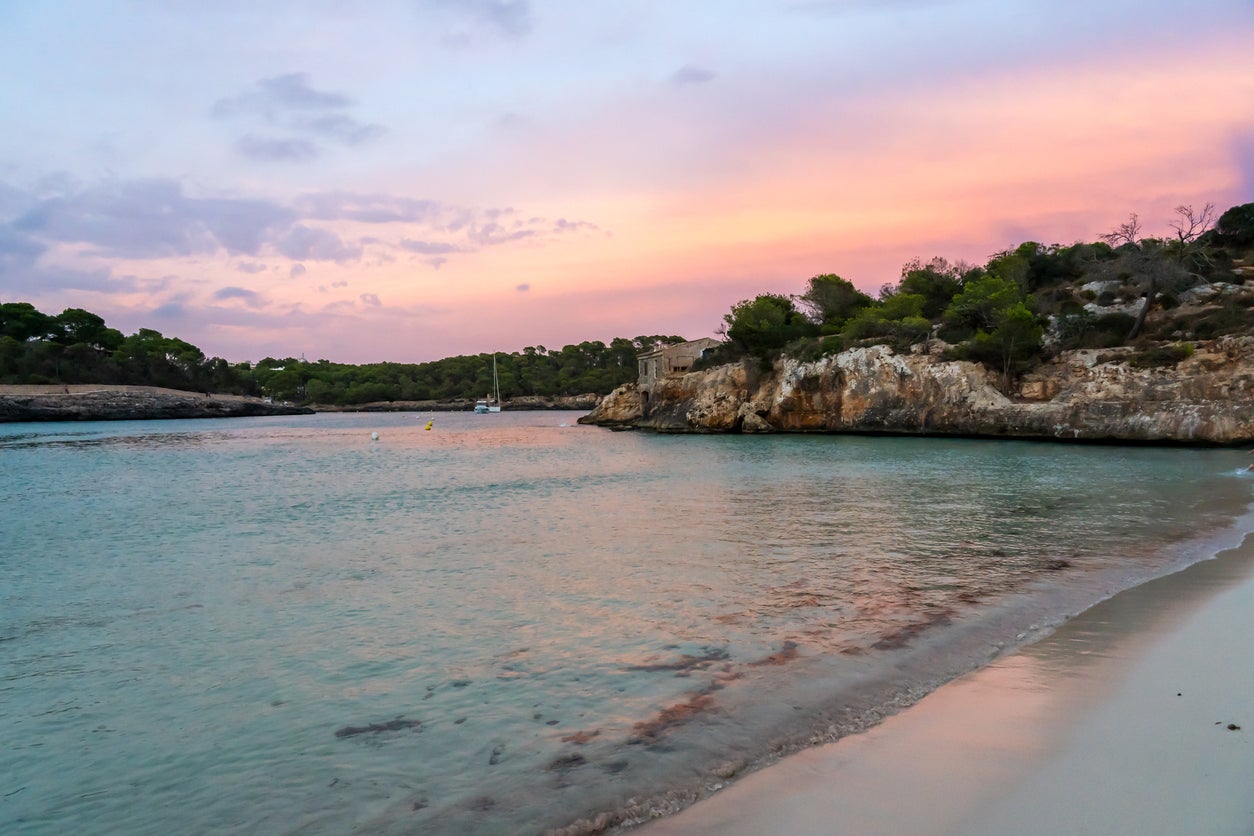
You could easily include half a dozen or more of Mallorca’s beaches on any list of the best in Spain. While Alcudia, Cala Torta and the vast 10km of Es Trenc are all honourable mentions, Cala Mondrago hits the sweet spot between natural beauty and necessary amenities. This beach has remained pristine thanks to its location within a national park, and the surrounding low cliffs give it a secluded feeling and a distinct sense of calm along its white sands. Parking is a short walk away, with a sun bed and parasol rental area on the sands and a handy beach bar for meals and cocktails.
Read more: The best hotels in Palma de Mallorca
Ses Salines, Ibiza
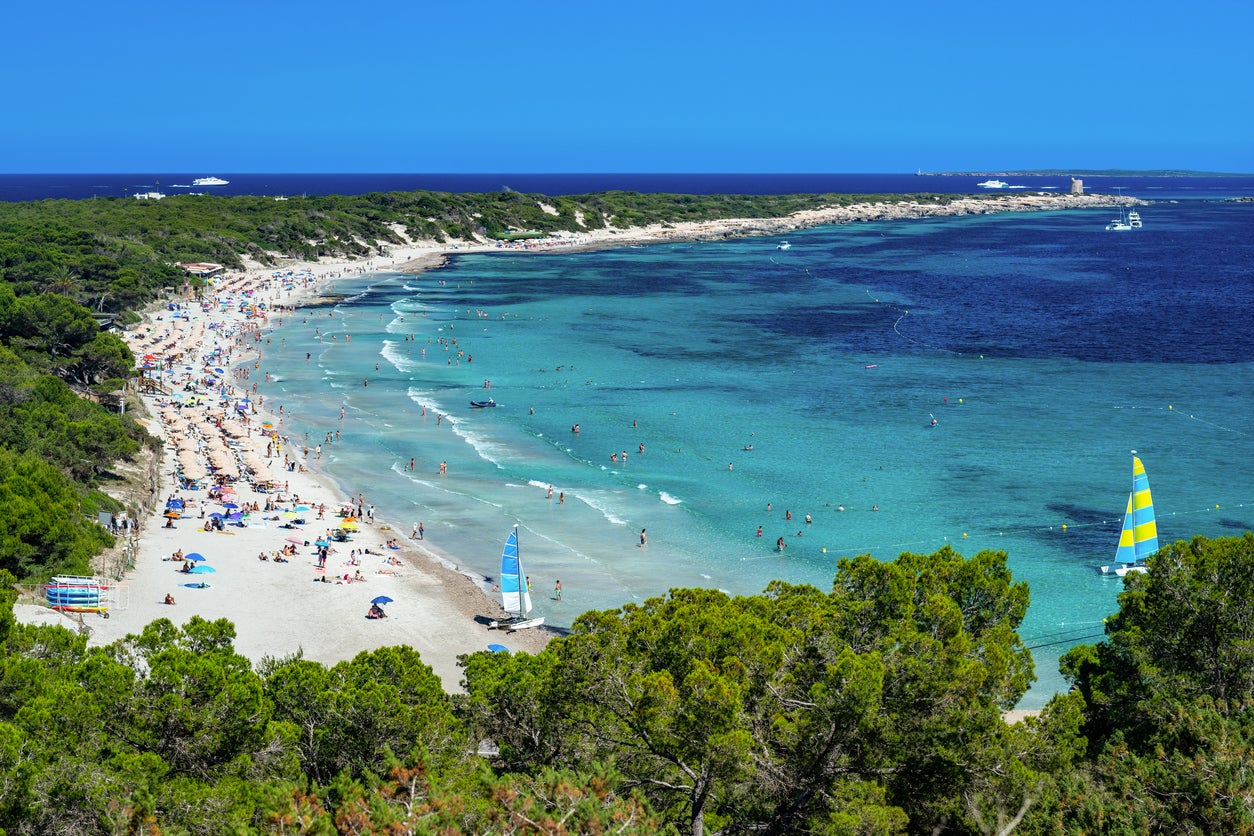
Ibiza is another destination blessed with a plethora of list-worthy beaches. While cliff-lined beaches and hidden coves like Cala d’en Serra or Es Portixol are enviable options, Ses Salinas gets our vote due to a combination of natural features, accessibility and a mixture of different crowds. It is situated less than 10 minutes from Ibiza Town by car or bus, and extends for 1.5km across the south of the island, backed by a large section of pine woods.
Holidaymakers of every type come here, though partygoers make up the majority of visitors, filling up the restaurants and chiringuitos throughout the afternoon and evening. There are plenty of facilities, from a small supermarket to pedalo and kayak rental, making part of the beach also popular with families looking for a more entertaining coastal area. In the southern part, there is a quieter section.
Read more: Best hotels in Ibiza: Where to stay in Ibiza Town, San Antonio, San Miguel and more
El Saler, Valencia
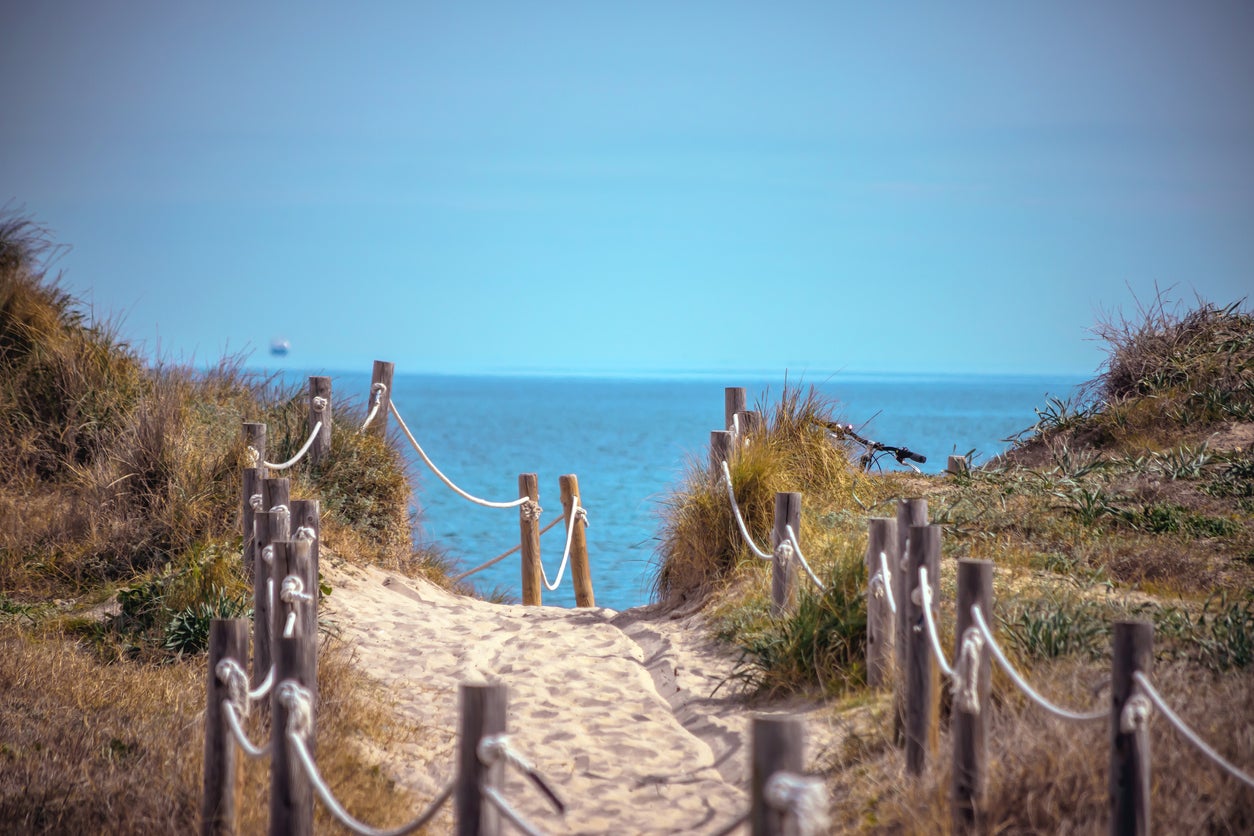
The 3km stretch of El Saler lies in the Albufera Natural Park, around 15 minutes from the centre of Valencia by car. A protected area of grassy dunes and fine white sands, it is surrounded by the pine woods and wetlands of Albufera, providing a suitably wild backdrop that also makes for a particularly tranquil setting. Though predominantly a wild environment, there are showers, toilets and a handful of restaurants nearby too.
Read more: How to be a good British tourist and why Valencia is welcoming us with open arms
Playa de Las Cathedrales, Galicia
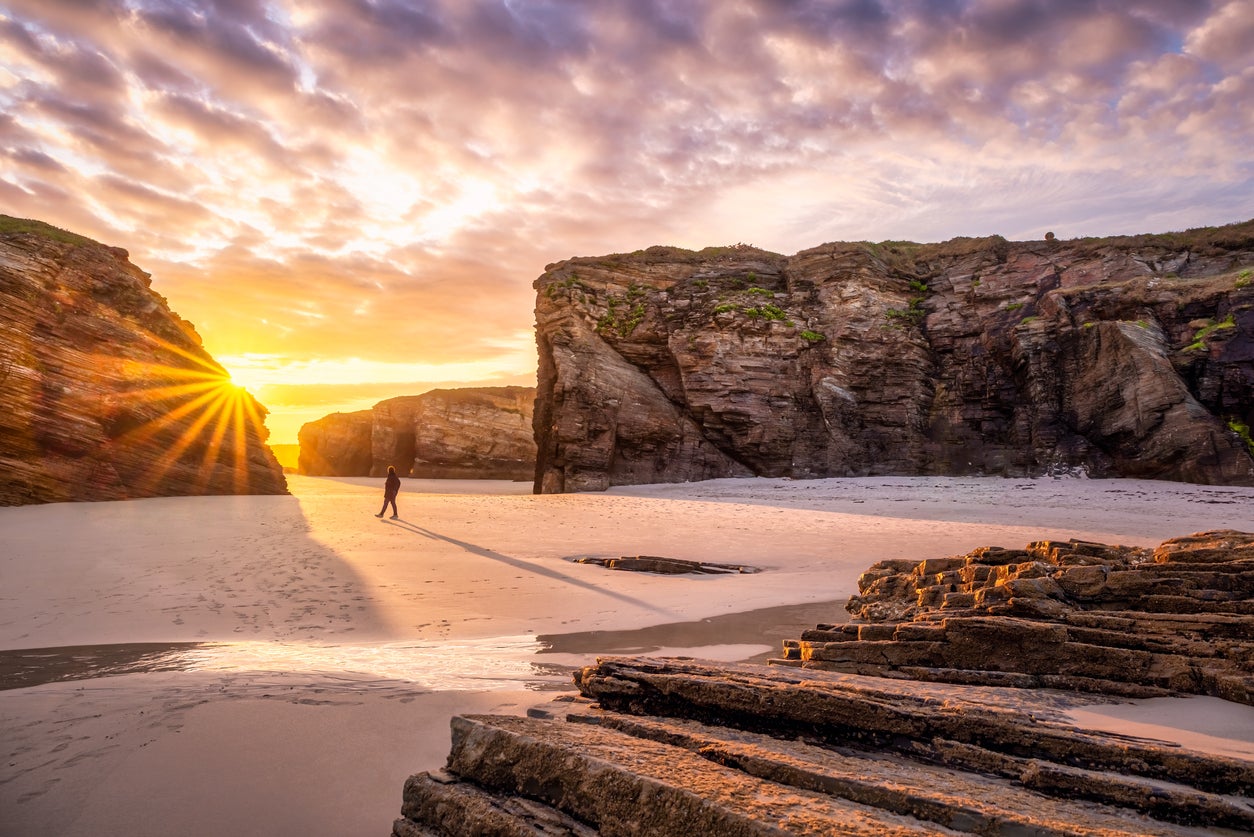
Perhaps the most picturesque beach in the entire country, the Playa de Las Cathedrales (often referred to as the Praia das Catedrais) lies near the town of Ribadeo in Galicia. It has an almost otherworldly setting, surrounded by towering cliffs and featuring several rock features including arches, towers and chambers. It is best to visit during low tide, when the rock formations are most visible, though swimming isn’t recommended due to strong waves. Nevertheless, it’s the ideal place for a scenic walk.
Playa de Monsul, Almeria
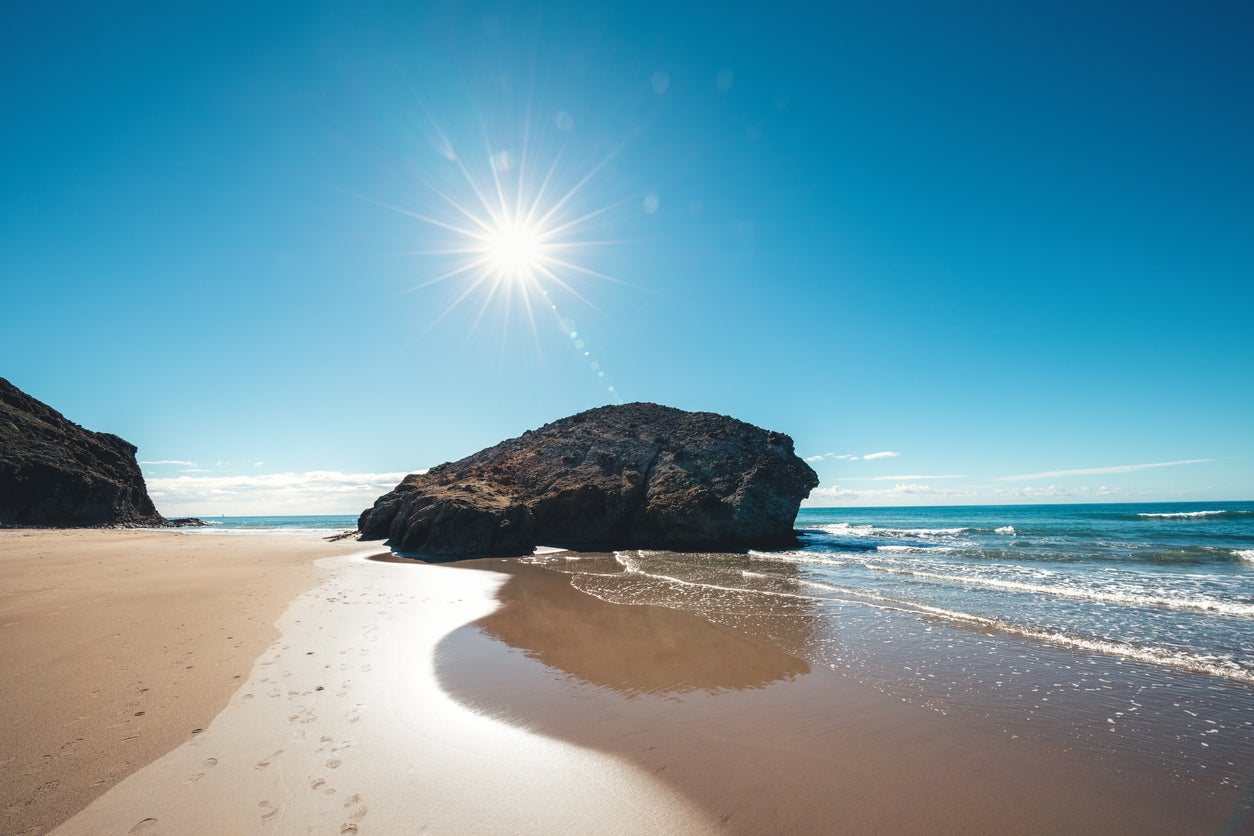
Lists of Spain’s best beaches always feature entries from Almeria, with the coastline of the Cabo de Gata-Nijar Natural Park especially popular. Las Salinas, Los Muertos and Los Genoveses all pop up now and then, but Playa de Monsul is top of the pack thanks to its unique lava formations, a series of coves and a blissfully isolated location.
The arid, quasi-desert landscape of the Sierra del Cabo de Gata leads to the gently sloping golden sands and calm turquoise waters of Monsul. The beach is characterised by a distinctive fossilised lava rock that has made it one of the most recognisable beaches in the country.
Playa de las Teresitas, Tenerife
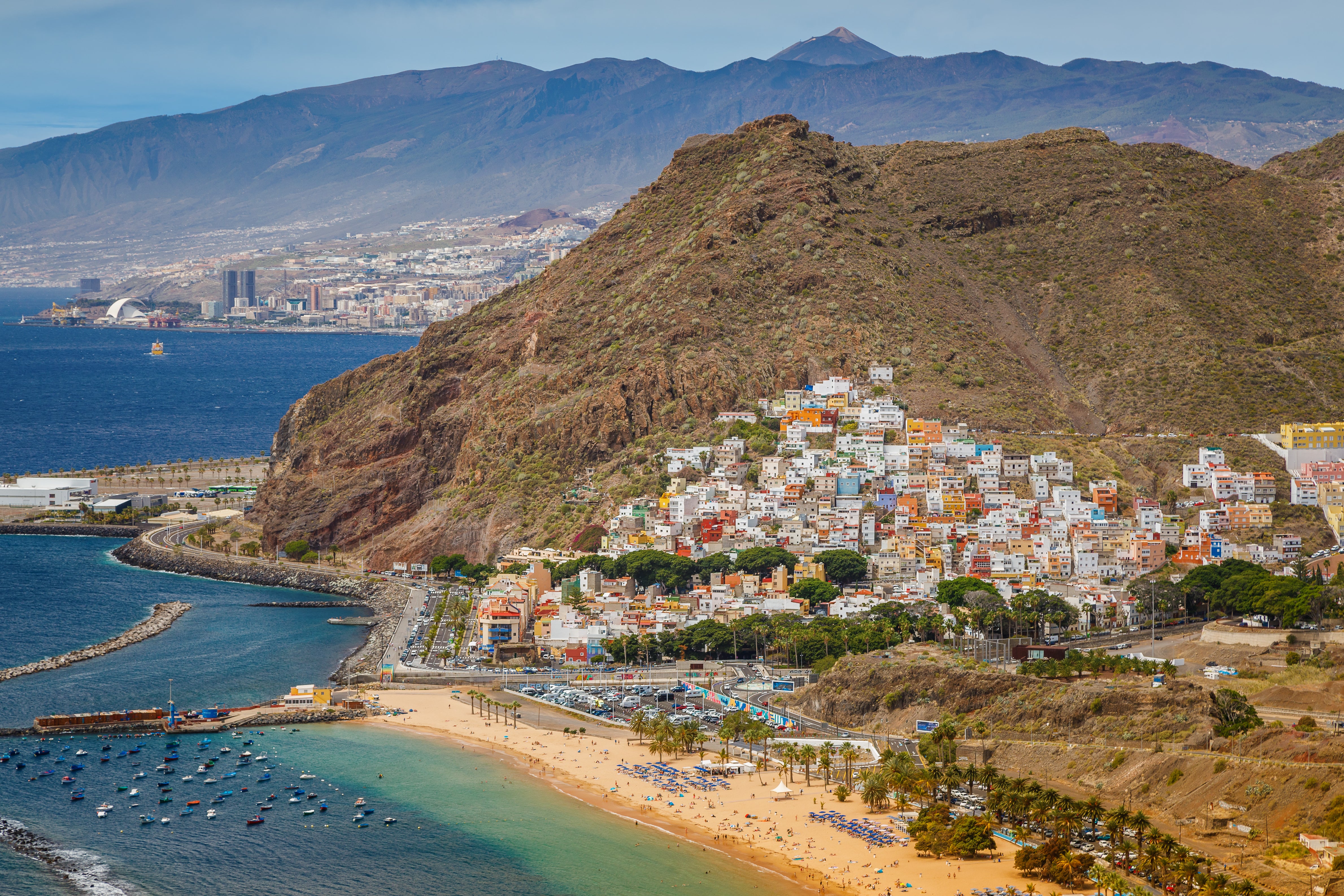
In a place filled with dramatic black sand beaches, a ‘normal’ beach has to be pretty special to be called the best on the island. The black sands of Playa Jardin, Playa de los Gigantes and Playa de la Arena get honourable mention, but Teresitas, in the north of Tenerife, really is special.
Home to white Saharan sands and deep blue waters, while lined with palm trees and backed by the Anaga mountains, it has the feel of a beach that is far from anything else you’d get in Europe. The lack of nearby resorts makes the beach a peaceful place despite its obvious beauty, and calm waters make for enjoyable swimming and water sports.
Read more: The best beaches in Tenerife
Ses Illetes, Formentera
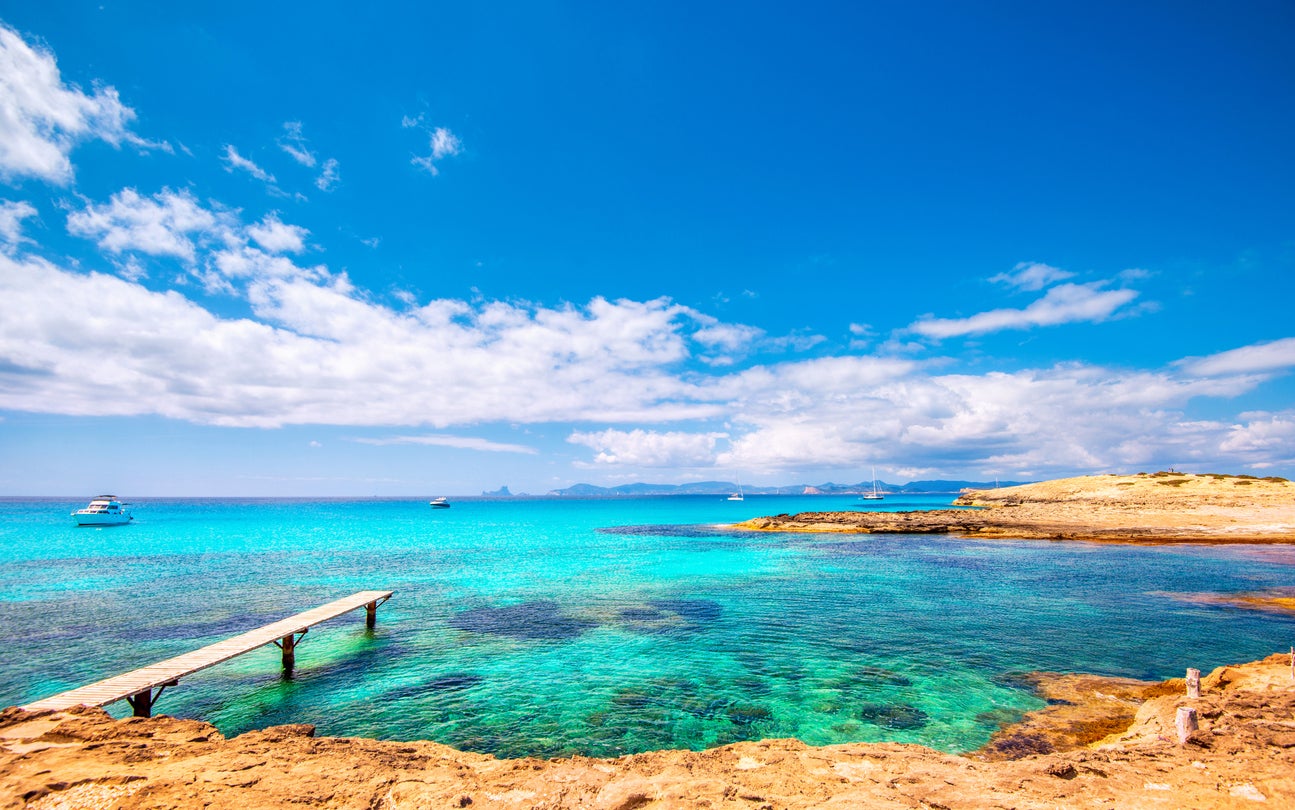
It wouldn’t be a list of ‘best beaches’ without a couple of entries that require that little bit extra to get to. For something that looks straight out of the Caribbean, try Ses Illetes: located on the small Balearic island of Formentera, it can only be reached first via a ferry from Ibiza and then, once on the isle, via a 30-minute walk through the Ses Illetes natural park.
You’ll soon come to Platja Illetes, a 450-metre stretch of fine white sands that meet turquoise waters. Another area that benefits from being part of a national park, the beach takes its name from a series of islets that lie close to the shore. These can be reached with a short swim, made easier by the calm, shallow waters that surround them.
Playa de Bolonia, Cadiz
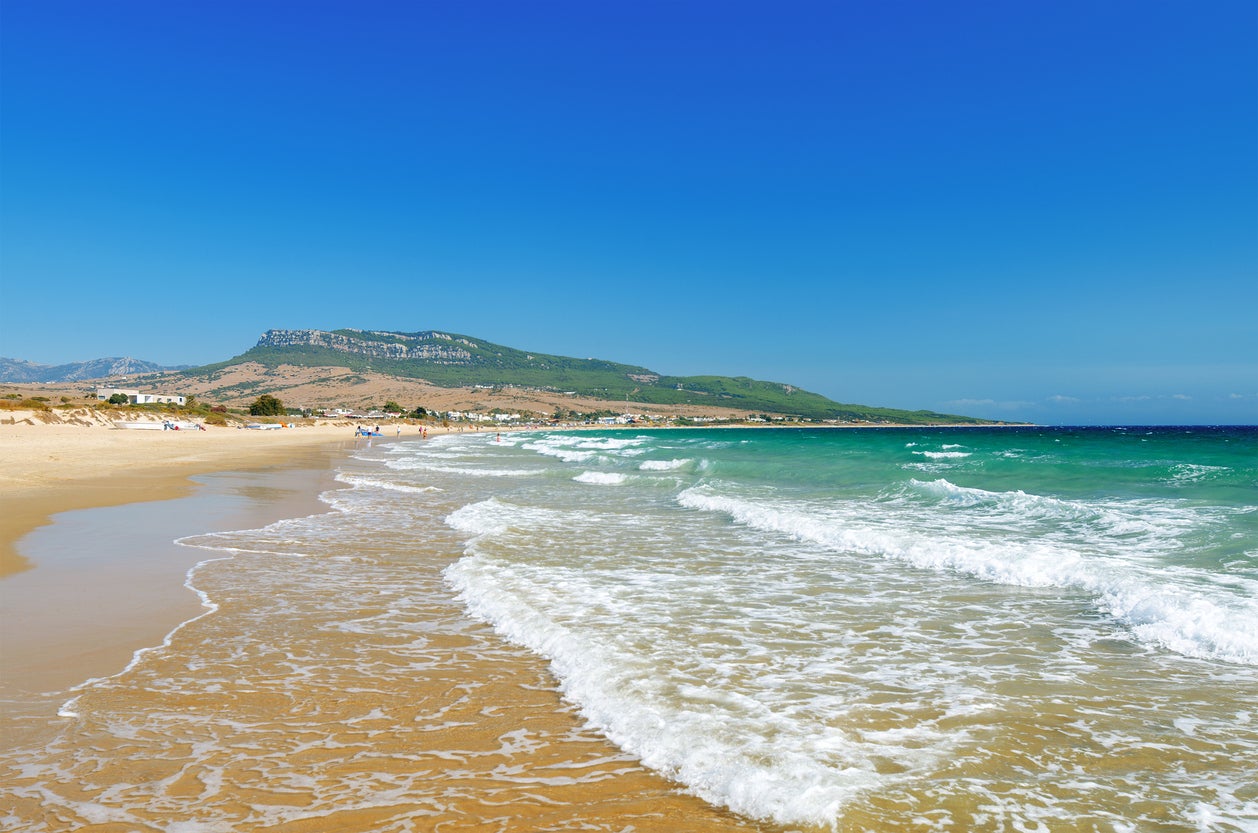
Cadiz is another region that features heavily on ‘best of’ beach lists, with El Canuelo and the coast around Conil always popular. However, Playa de Bolonia, located near the ruins of the Roman town of Baelo Claudia, gets our nomination for its combination of natural features and water sports opportunities.
Found within the El Estrecho Natural Park, it is set in front of a towering area of fine white sand dunes, dotted with grassy knolls and pine forest and pleasantly free of tourist developments, leaving just a handful of chiringuitos and restaurants. A popular destination for wind surfing, kite surfing and paddle boarding due to the influence of southwesterly winds, it is also a good place for swimming in natural pools when the tide is low.
Pechon Playa, Cantabria
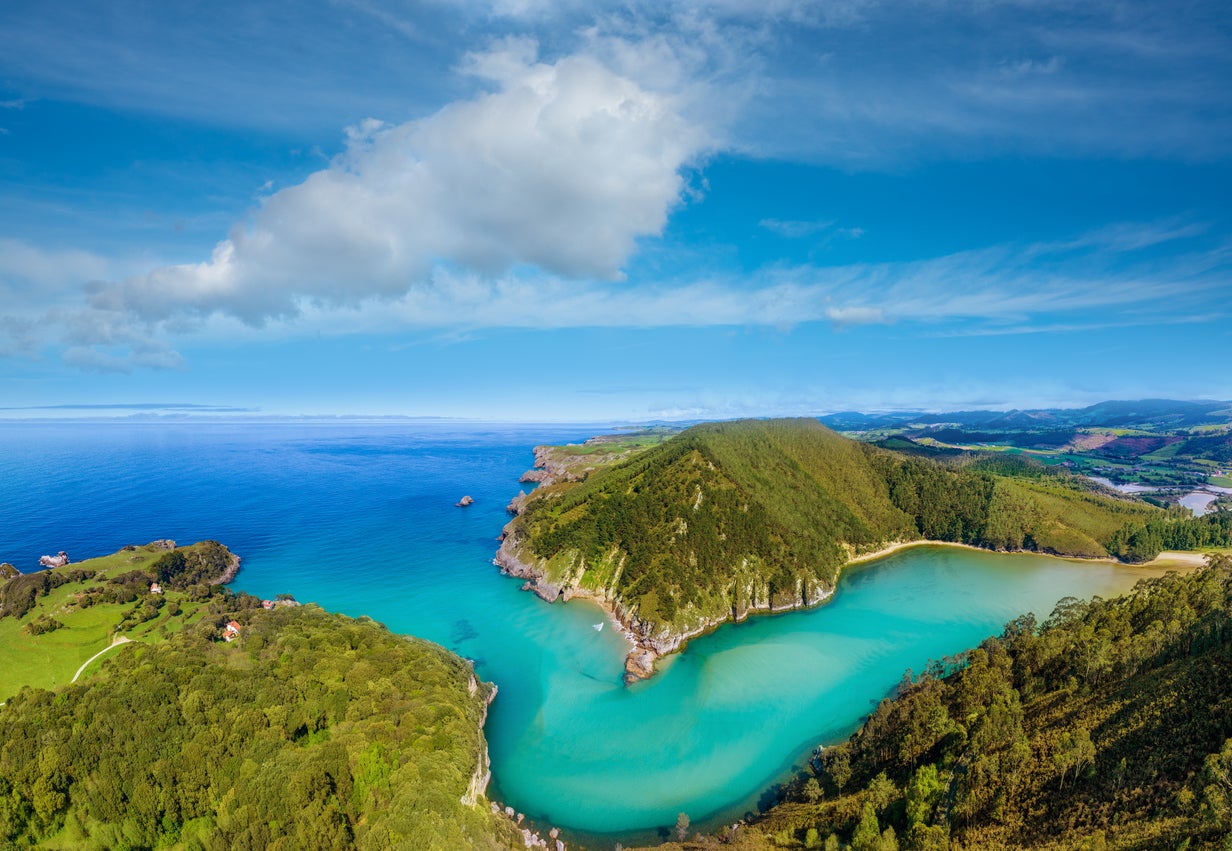
The verdant valleys and emerald waters around this part of Cantabria are somewhat reminiscent of a Polynesian island. There are several beaches around Pechon but Pechon Playa is the most picturesque, running along the valley of the Ria Tina Mayor and almost completely surrounded by hills and forest. Look north and the river opens up into the Atlantic Ocean, or go south and take a canoe or kayak from Unquera to take in the best of the winding river.
Playa de Rodas, Islas Cies
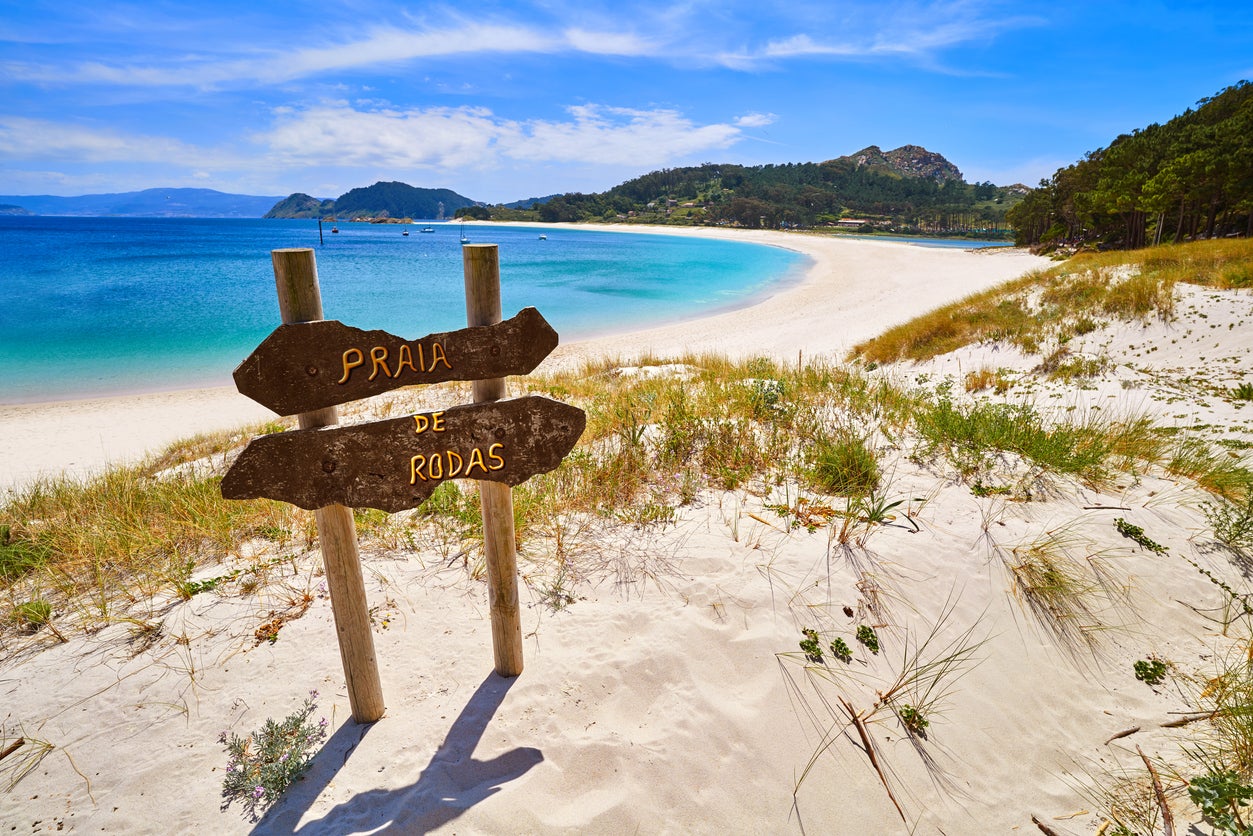
What was that we said about the beaches that are harder to reach? It doesn’t get much more isolated than the Islas Cies, which lie off the coast of Vigo and are only accessible via a 40-minute ferry from the mainland. Part of the Atlantic Islands National Park, these beaches are wonderfully unspoilt thanks to the lack of buildings and accommodation. They provide idyllic landscapes, flanked by rugged mountains or dense forest and boasting the customary Caribbean-white sands and turquoise waters. Nearby, a small section of sand also links Rodas to Playa de Figueiras, another of the Cies’ exceptionally beautiful beaches.
Isuntza and Karraspio, Basque Country
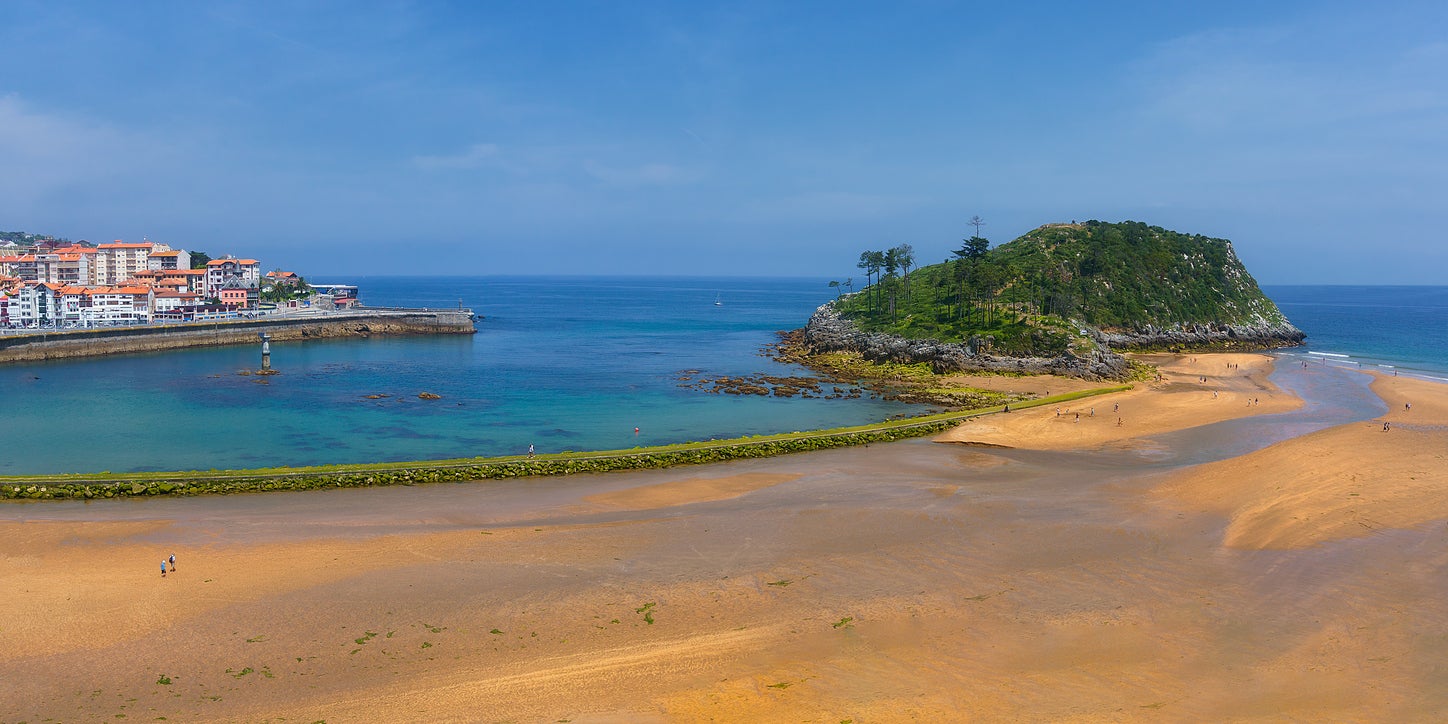
The port and harbour areas of the Basque town of Lekeitio are charming enough, but the nearby beaches of Isuntza and Karraspio – the former beside the harbour and the latter across the river – provide an alternative to La Concha in San Sebastian. Backed by a charming Basque town and featuring a small wooded island, this wide area of golden sands is great for a relaxed afternoon or picnic, though its shores are also popular with surfers and other water sports enthusiasts.
Calo des Moro, Mallorca
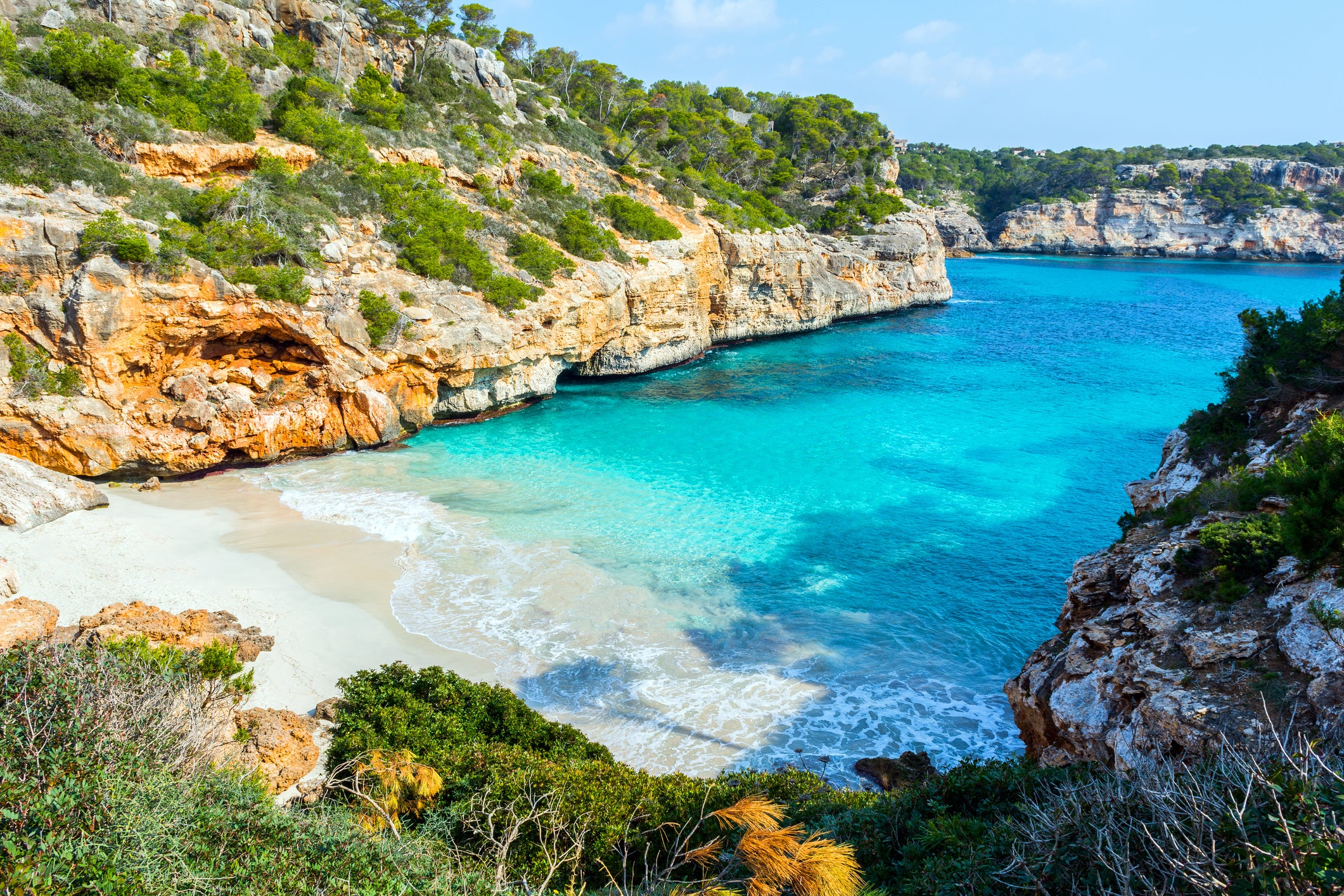
Calo des Moro on the island of Mallorca is small but spectacular – and teeming with marine life for snorkelling sessions. Climb down the sheer cliffs for a dip in the turquoise waters and stay till late to catch the colours of one of Spain’s best sunsets with a tapas picnic. Visit from June to September for warm ocean temperatures, and anchor on a hired boat to beat the crowds to the pale shore.
Tossa de Mar, Costa Brava
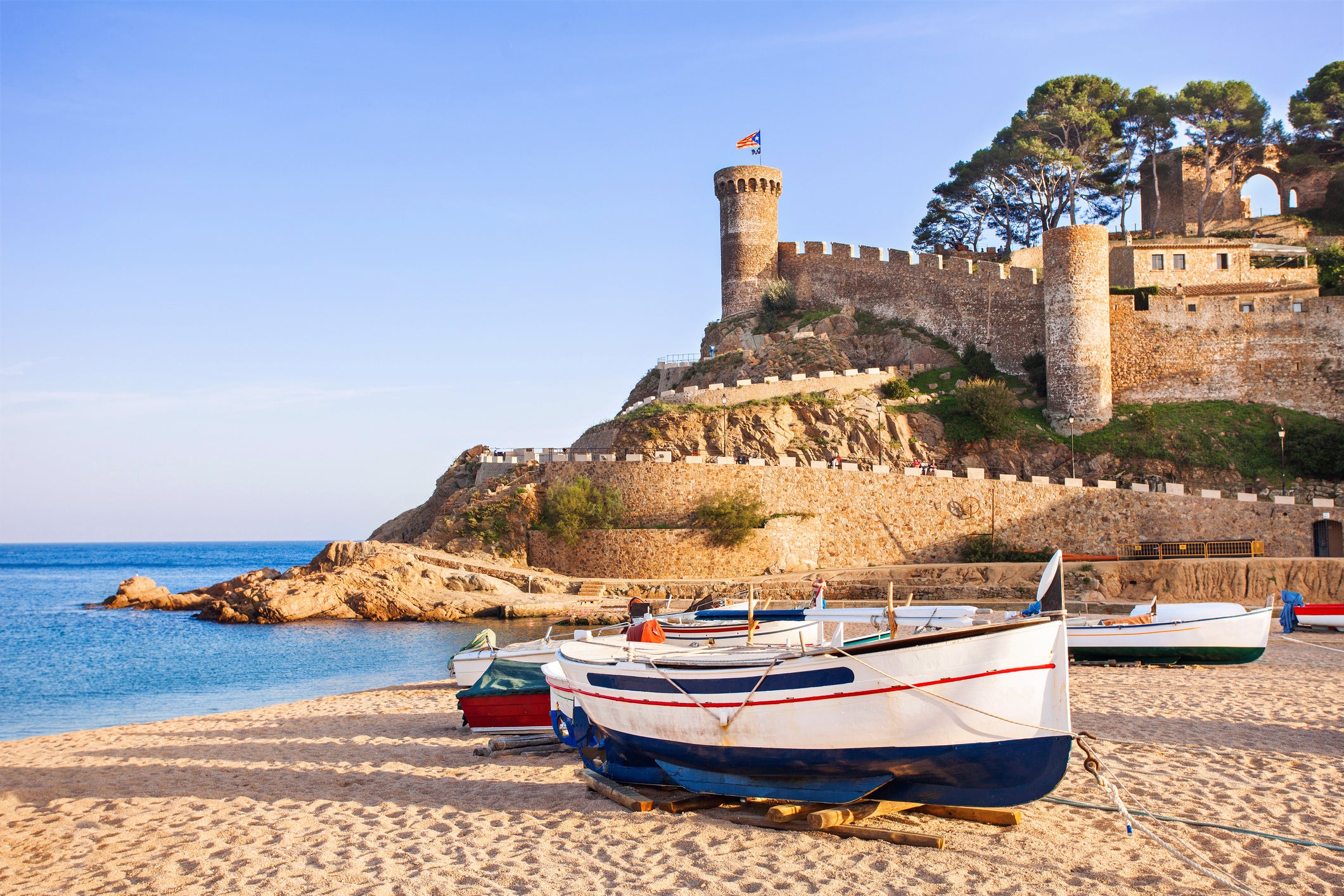
Be charmed by the Costa Brava coast with a beach day on Tossa de Mar’s golden shore – undoubtedly best enjoyed tied in with lunch in the medieval quarter post-siesta on the sand. The string of serene beaches in Girona are framed by pine trees and turrets and ideally situated for a day trip away from the high rises of Barcelona.
Ballota Beach, Asturias

A crescent of sand complete with its own craggy island, Ballota Beach sits near the Cantabrian border and is a dream for secluded sunbathing and peak season paddles. With crystal shallows and a sandy seabed, it's well worth following the track on foot to enjoy this shell-shaped slice of coast on Biscay Bay.
Alzada Beach, Fuerteventura

Within the dunes of Corralejo, the wide and wild Alzada Beach is a haven for adventurous travellers heading off the beaten track in Fuerteventura. The golden stretch just west of the African coast is easily accessed from the main road, with waves to surf and a small beach shack for snacks.
Cala Granadella, Costa Blanca
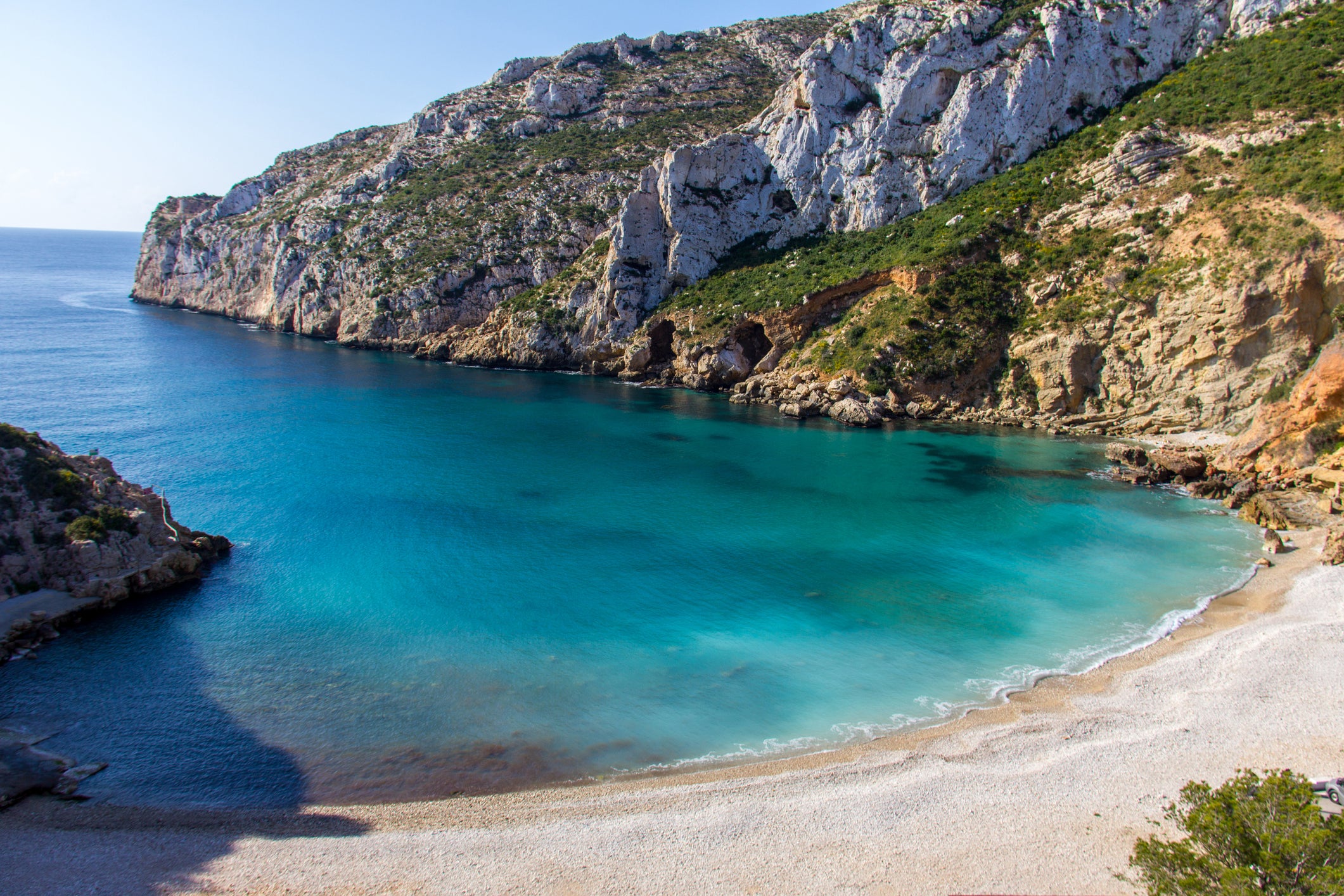
A star on the Spanish coastline, blue flag Cala Granadella in the Alicante region is carved out of pine forest with emerald waters and a 160m-long pebbled shore. Here, kayaking and paddle boarding will entertain water sports enthusiasts while afternoons spent snorkelling and scuba diving promise a glimpse of sea bream, stingrays and jellyfish.
Cala Gat, Mallorca
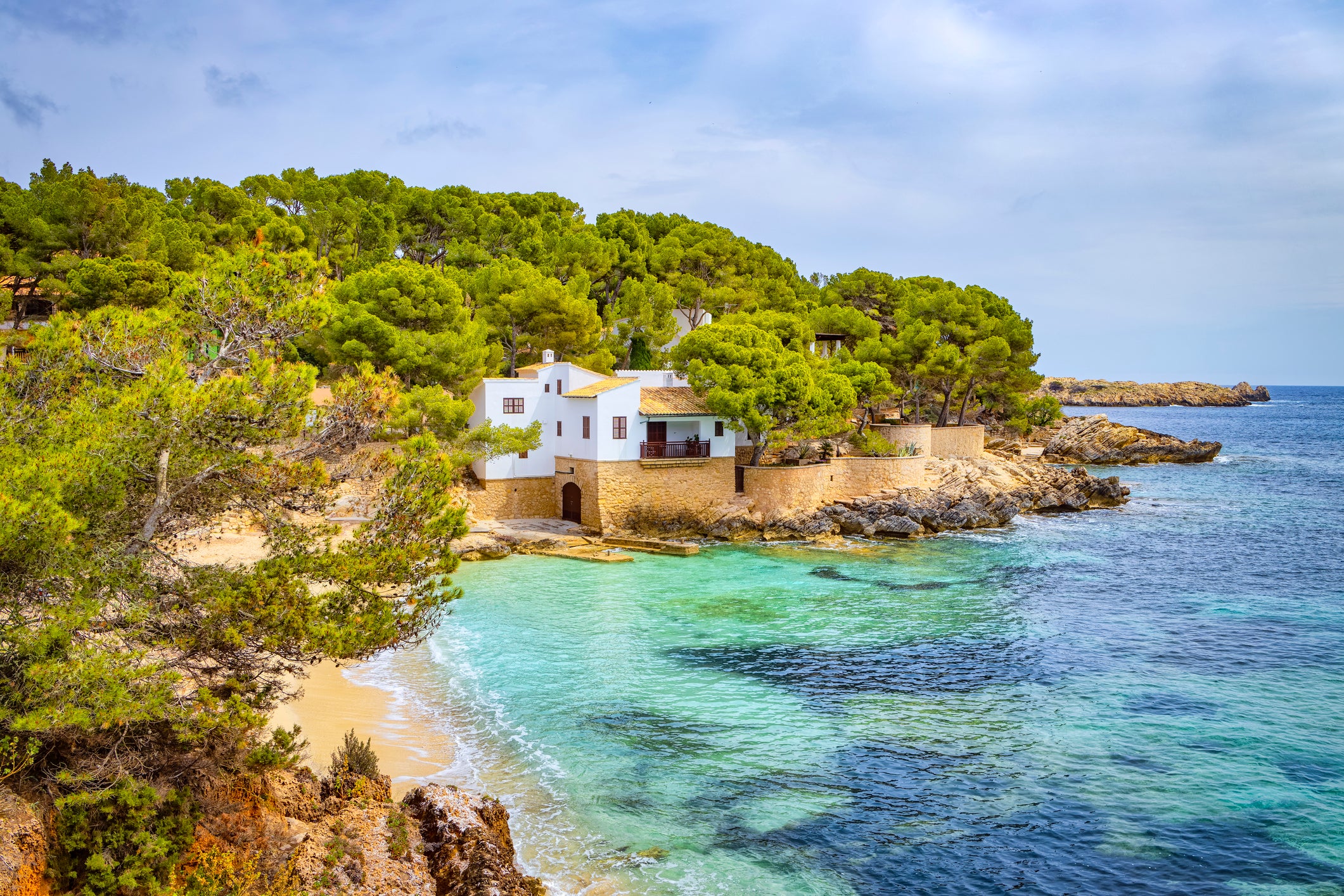
Although it’s sure to be a squeeze during the summer season, postcard-perfect Cala Gat is one of Mallorca’s best coves to know when there’s space to lay your towel. The forest-backed beach between Cala Ratjada and the lighthouse of Capdepera is a favourite for the yachting crowds and, with fine sand, azure waters and armies of fish, it’s no surprise.
Puerto Banus, Marbella
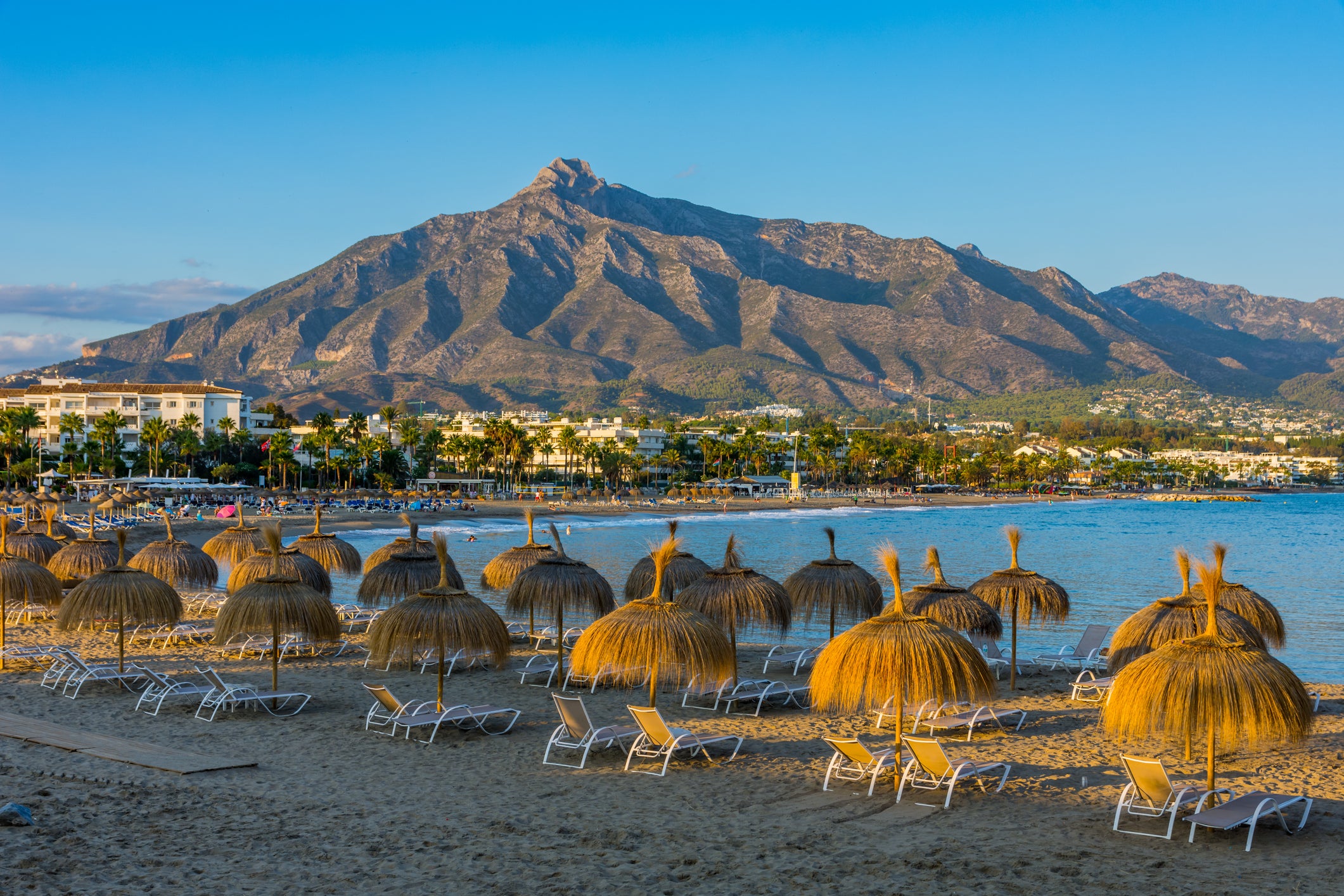
For sand that sparkles, Marbella’s Puerto Banus may be too glitzy for a budget beach day, but it’s a favourite with A-listers for a reason. The golden mile with views of the La Concha Mountain is well served by sangria to sunbed bars with music, watersports and stylish beach clubs creating the picture of Mediterranean indulgence.
Cala sa Boadella, Lloret de Mar

If peace away from package holidays is more your thing, Cala sa Boadella has 250 meters of untouched Costa Brava coastline for swimming and bathing in silence. Holidaymakers may want to bear in mind that nudism is authorised on this eyebrow of sand before they follow the dirt path past the Chapel of Santa Cristina for 200 meters to Boadella.
Amio Beach, Cantabria
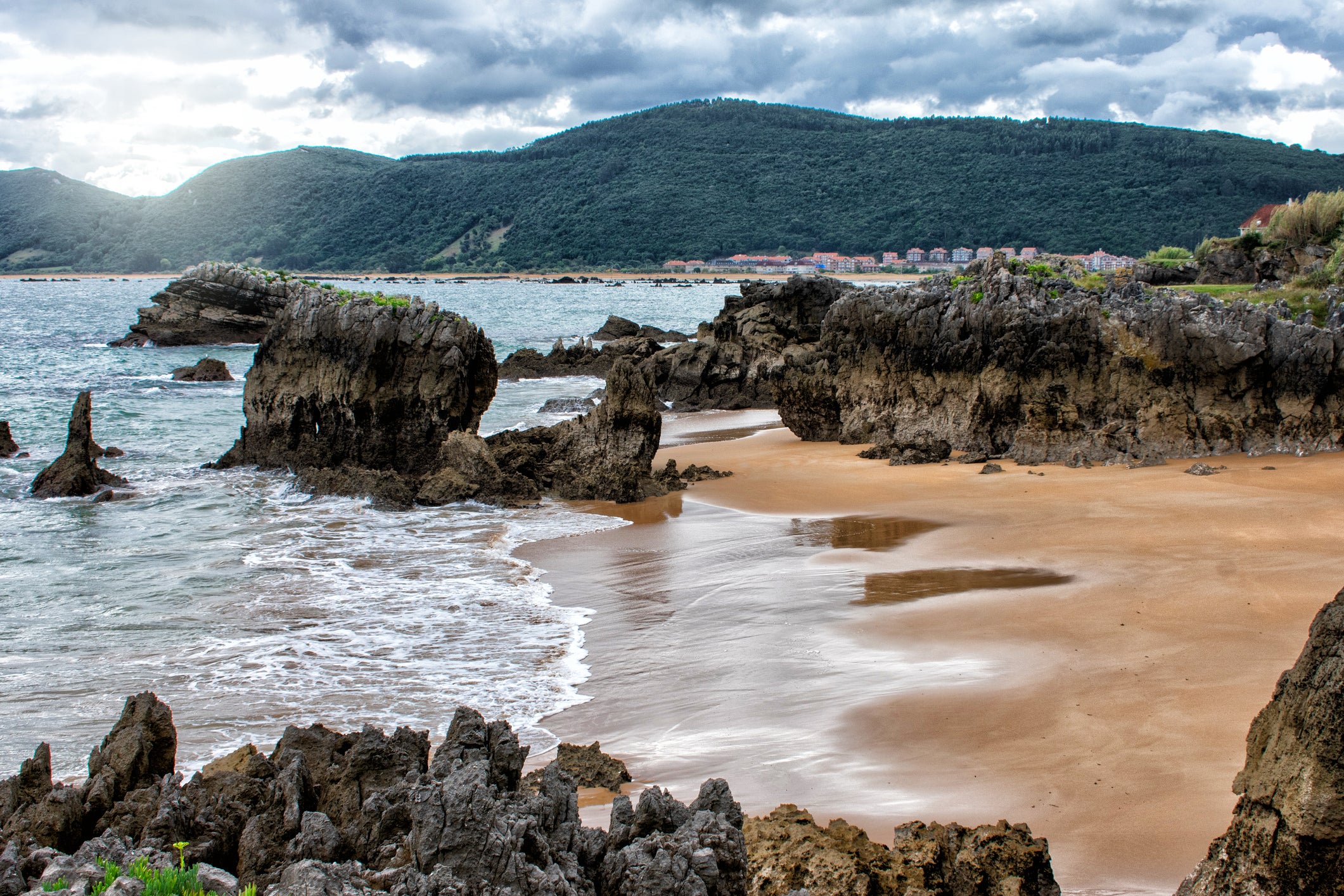
Just past the traditional town of Pechon, this wild playa is immersed in nature and a hotspot for hiking, surfing and bird watching. With no big and brash resorts for miles, Amio is at its best when the tide is low, with a small shop for ice cream scoops not too far from the shore.
Cala Pregonda, Menorca

A jewel on Menorca’s secluded north coast, Cala Pregonda is a cove of cerulean blue scattered with rocky islets. The scenic bay is reachable by a half-hour stroll along the Camí de Cavalls coastal path so pack a picnic to spend a day snorkellling with the technicolour schools of fish that help score Pregonda a spot as one of the best beaches in the Balearic archipelago.
Playa del Trabucador, Tarragona

Playa del Trabucador in Tarragona is 6.5km of very little but sand, sea and spectacular sunsets best seen from the wooden dock of Barra de El Trabucador. Both flamingos and kite surfers take flight from the beach – a natural isthmus in the Delta del Ebro nature reserve – that connects the Ebro Delta with La Banya Point.
Playa Papagayo, Lanzarote

The golden beaches of Papagayo take prime position on the southernmost tip of the Los Ajaches Natural Park – follow the dirt track and pay the €3 entry fee for paradise found. The popular crescent cove sheltered by cliffs makes for a relaxing reading spot, ideal for topping up a tan, treading turquoise waters and snorkelling reefs teeming with marine life.
Read more: The best beaches in Lanzarote
Join our commenting forum
Join thought-provoking conversations, follow other Independent readers and see their replies
Comments